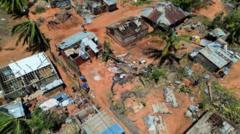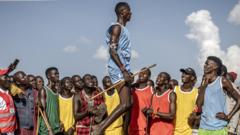The Vatican, alongside several other nations, has obstructed critical negotiations concerning women's rights at the COP29 climate summit by rejecting proposals that include references to gender issues, ultimately jeopardizing support for women facing the impacts of climate change.
Vatican's Opposition to Gender Rights Stymies Women's Climate Support at COP29

Vatican's Opposition to Gender Rights Stymies Women's Climate Support at COP29
A coalition led by the Vatican has blocked discussions aimed at enhancing women's support in climate change initiatives at the UN COP29 summit over concerns surrounding gender rights.
The Vatican has initiated a significant delay in discussions concerning women's rights at the UN COP29 climate summit in Azerbaijan, following tensions related to gay and transgender rights. Allegations suggest that the Vatican's Secretary of State, Pietro Parolin, representing Pope Francis, has supported an alliance with nations such as Saudi Arabia, Russia, Iran, and Egypt to hinder advancements that would have provided essential support for women disproportionately affected by climate change. Colombia’s environment minister, speaking to BBC News, emphasized the urgent need for such discussions, as UN estimates indicate that women and girls constitute approximately 80% of individuals displaced by climate crises.
The COP29 summit was intended to update the decade-old UN action plan known as the Lima Work Programme on Gender to ensure that women’s experiences in climate-related matters are acknowledged and included in funding decisions. The Vatican and its allied nations are resisting any mention of the term "gender," asserting concerns that it may encompass transgender individuals, while simultaneously seeking the removal of references that focus on LGBTQ+ rights. This development has been criticized by various advocates and NGOs, including ActionAid, which called the situation "unacceptable," reiterating the existential challenges women face due to climate change.
Joe Amdad Hossain/Getty Images reported on increasing instances of food insecurity among women and girls, projecting that by 2050, the number impacted will rise significantly compared to their male counterparts. Notably, discussions from African and EU nations have aimed to underscore the varying experiences of women based on dimensions such as gender, race, and age. However, the Vatican and its allies have maintained that these terms should not be included in negotiation texts, stating their legal and moral objections.
Observers have expressed shock at the Vatican's sudden opposition to longstanding gender language, highlighting a broader global trend perceived as a backlash against women's and LGBTQ+ rights. Despite the Pope’s prior gestures towards accepting more inclusive church practices around same-sex unions and transgender individuals, the Vatican's official stance remains that marriage should exclusively be between a man and a woman.
With only three days left in the conference's schedule, the deadlock over women's support is jeopardizing negotiations just as the current framework is set to expire. Advocates have called attention to the insufficient representation of women in negotiating roles at COP29, where, according to UN reports, only 36% of negotiators were women last year. This underrepresentation, they argue, undermines the ability to produce policies reflecting the realities faced by women in climate-impacted regions.
The EU has attempted to counteract these developments by publishing a joint letter backed by 17 countries, affirming that addressing the climate crisis is contingent on committing to the empowerment of women and girls across diverse backgrounds.


















